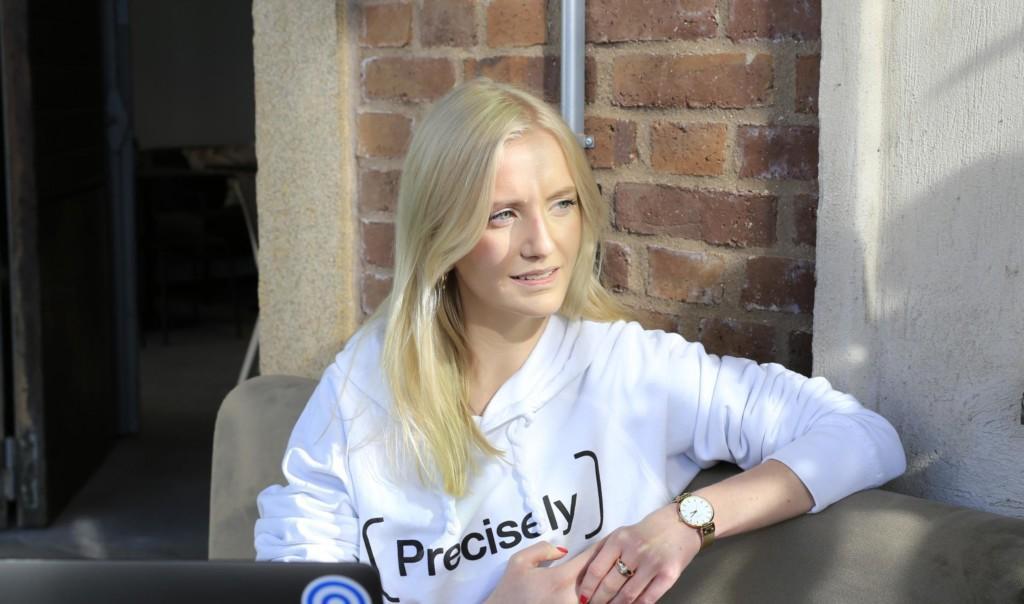Lessons from my first year in legal operations

Precisely’s Legal Engineer Jenny has always been interested in law and technology. When it came to choosing a career, the former triumphed. Since Jenny started at Precisely in 2021, she has been working with efficient legal operations, dedicating her days to both law and technology. In this article, we will sum up her most valuable lessons. Helpful advice for legal operations professionals, or anyone thinking about legal ops as a future career choice, awaits.
Jenny’s first year in legal ops has passed more than quickly. She is sure that the coming years will fly by as well. When asked what a typical workday looks like, the answer is short – there isn’t one. Every day offers new insights, lessons, and challenges. Which is what Jenny finds so interesting and inspiring.
Working as a legal operations professional
Working in legal operations is all about developing, executing, and maintaining effective processes for the legal department.
“To me, legal operations is everything that is not “standard” legal work like the actual contracting or negotiating. We develop and execute new projects and processes, plan and drive improvements, scout for new technology, and ensure that legal tech software is implemented as well as integrated with other systems used in the company. We plan the legal functions following the corporate vision, aiming to bring value to the company.”
To me, legal operations is everything that is not “standard” legal work like the actual contracting or negotiating.
In her role at Precisely, Jenny sees it as her job to first and foremost assure that legal functions run as smoothly as possible within the company. But she also sees it as her mission to share knowledge on efficient contracting solutions with other legal teams.
“I know we have the best product on the market – a product that can help legal departments save both time and money. Making other departments in your company self-serving in contract management lets the legal team dedicate its time to value-bringing work. Even if the workload is shared with other departments, the control stays with the legal team since they authorise user permissions and approve changes. You have everything related to contracting in one place – organised, safe, and easy to find. In the end, using a contract software means freed-up time, less impediments, and increased revenue for the entire company.”
Legal operations responsibilities
Even though legal operations duties have existed for a long time, it is only recently that an articulated definition of the legal ops role, as well as its responsibilities, is available.
“But legal operations responsibilities will vary depending on the company. Every legal operations role is different, and may focus on different areas, like financial management, or the use of technology. For me, legal ops starts and ends with finding where legal is inefficient and handing over the solution or new process to the legal team. Those inefficiencies depend on their context.”
Our guide on how to be successful in legal operations gives a comprehensive understanding of how to succeed in the role.

Making the legal department more efficient
Typical legal operations tasks include improving workflows and creating optimised processes. Guidelines, roadmaps and strategies need to be created and made visible. Part of the job is scouting for tools that uphold those workflows and promote a more efficient legal department.
“Legal ops needs to identify problems and processes that are not working, finding out where the bottlenecks are and where money is lost. Once these inefficiencies are identified, it is up to legal ops to find funding, and a way to implement the solution. Not to mention, make sure that it is utilised effectively.”
A typical work week for a legal operations professional includes communicating with other departments, such as Finance, Development, Customer Success, and IT who may all be involved in the contracting process, to get the latest news on what the customers are telling them. “This is one way of understanding how we can improve business and legal from many different perspectives”. In the end, all these opinions sum up to the impression of the company.
Common bottlenecks in legal and how to solve them
As a legal ops professional, you will step into the role with an urge to improve everything. One thing that Jenny has learned is the importance of taking one step back – to listen and observe. This is the best way to get to know the universe that your company operates in and the pain points of your department.
Once you have a clear image of this, you can start solving business-critical bottlenecks. Below are common challenges, and their solutions, that Jenny has identified during her first year working with legal ops.
Be open-minded to new solutions
Jenny emphasises the importance of being open to unknown solutions when looking to improve the legal workflow.
First of all, listen and understand what is needed. See if problems overlap. “For instance, you might think that e-signing is the solution to your problem. And it might be. But perhaps a full contract lifecycle management software would solve the e-signing, in addition to many other challenges that you hadn’t thought were connected. One software could be the solution to several challenges. This is why it is so important to scout new legal tools with an open mind.”
Dedicating time to scout for tools is essential. With extensive research, the probability of finding an appropriate solution is higher.
Speaking to vendors can be very helpful since they are experts on their products and the market. Take advantage of demo sessions or even free trials to understand the advantages and how they apply to your context.
Optimise slow processes with contract automation
In legal departments, contracting processes can be both slow and monotonous. According to a DocuSign survey, two-thirds of incoming legal requests are for contract work. Over 80% of legal respondents are “often” or “always” involved in both the preparation and management of agreements.
Jenny says it is important to get to the root of this problem. “One thing that I have learned during this year is that bottlenecks are not a sign of lack of competence, but rather inefficient processes. That’s where one should start.”
Inefficient processes are a reality for legal departments. 99% of respondents say they do not have the data and technology they need to optimise contracting processes, according to The 2021 EY Law Survey.
With contract automation, the legal department will have fewer administrative tasks. This permits them to spend time on more value-bringing work. “I don’t think anybody likes, for example archiving, manual meta-data tagging or repetitive simple tasks. If we let our employees dedicate their time to more sophisticated tasks it will lead to increased revenue and improved employee health. It’s a win-win.”
Improving contracting and freeing up precious legal time is crucial. Don’t let inefficient contracting impact revenue growth.
67 %
incoming legal requests are for contract work
80 %
involved in the preparation and management of agreements
99 %
don't have the technology to optimise contracting
Avoid friction with thorough onboarding
When implementing new tools, make sure that you have the team with you. Show the advantages it will have on employees’ work situations, and how it can improve current workflows.
Avoid friction and slow implementation by ensuring a thorough onboarding. Remember, the successful implementation of any new workflow depends on the legal team’s aspirations and inspiration to use the system at hand.
Ensure investments in the legal department
As always, money matters. For a legal operations manager, one of the most frustrating things is to see inefficiencies but not be able to solve them because of financial constraints.
“Make sure you have management with you, and that they understand the importance of investing in the legal department. Show how you will give them a return on their investment with more efficient and satisfied employees, as well as content customers.”
Break down silos with communication
It is very common for different departments, within the same company, to work in silos. Many times there is no, or very little communication between them. This is unfortunate.
Legal ops represents legal but is still at the heart of the company, and needs to communicate with numerous employees and departments daily. Often, delving into the situation in other departments is how Jenny finds processes needed to be improved. “Sometimes I find them by searching for them, but often they come to me through conversations with colleagues. You might find the inefficiency, or the inefficiency finds you, so to say. It’s all about talking to, and listening to, people.”
“One of the strengths in my position is that I have daily contact with many of the departments here at Precisely. This is how I keep up-to-date with all the developments, and how I lay the foundation for my job. We are all striving towards the same goal. My job in it is to make sure that legal does its part. Optimised legal processes benefit other departments, as well as the entire company.”
A decentralised contracting culture involves other departments in contract creation and management. The fact that all departments work in the same platform creates close connections and a better understanding of one another’s job. It saves everybody time, minimises the risk of human errors, and makes sure that the contracts are compliant.
Legal still sets the rules and gives permissions, but the hands-on work can be done by others. Even persons without a background in law.
“A sales department is typically a very fast-paced department that wants to close deals fast but in many cases needs legal help. By adjusting your process to meet their needs, contact with legal doesn’t have to be a pain, it’s fun.”
My job is to make sure that legal does its part. Optimised legal processes benefit other departments, as well as the entire company.
Be curious about your customers’ needs
Besides having good communication within the company, Jenny accentuates the importance of communicating with customers. Do you understand their needs?
For example, when negotiating or drafting supplementary agreements with current customers, take a minute to ask how the customer experience could be improved. Ask about their experience with the signing process or upgrading of amendment agreements. They might enlighten you on experienced bottlenecks or improvements needed.
Legal tech makes legal work more interesting
Smiling, Jenny remembers when she started law school years back. Her brother, who is very much into tech told her that she would probably be out of a job within some years.
“I didn’t believe him then, and now I’m even more convinced that he was mistaken. I am very privileged to be working with both law and technology daily. Precisely is the perfect place to be – I’m experiencing how technology can help lawyers and other professionals without a background in law, with contracting. Precisely‘s platform can ease the workload, and let employees concentrate on more interesting and value-bringing tasks. Rather than taking lawyers’ work away, technology only makes it more interesting.”
Your company needs legal ops
When reflecting upon her first year in legal ops, the conclusion is direct and redundant: “Your company needs legal ops. The entire organisation will notice the positive effects of this function. It is essential to work efficiently, and keep both employees satisfied with their work tasks as well as giving customers, vendors, and suppliers a good experience with you as a company.” We couldn’t agree more.


